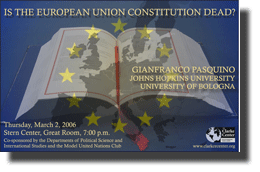Thursday, March 2, 2006
Is the European Union Constitution Dead?
Stern Center, Great Room, 7:00 p.m.


Issue in Context
The Treaty establishing a Constitution for Europe is an international treaty commonly known as the European Constitution . The purpose of the Constitution is:
- to bring together for the first time the many treaties and agreements on which the Union is based,
- to classify human rights and democratic principles through the European Union (EU),
- to define EU powers, stating when it can act and when the member states retain their rights of veto,
- to identify the roles of the EU institutions,
- and to make the decision-making process more efficient in what is currently a 25-member organization.
The Constitution’s effort to encapsulate all previous treaties enormously increased the document’s complexity and raised doubts about its effects in the diverse European setting. Furthermore, some countries saw it as instituting a European super-state, while other alleged it was establishing an ultra-liberal economic conglomerate. The constitution received additional criticism for extending the EU jurisdiction into areas of national strategy, such as immigration, asylum, and justice.
The treaty was signed in 2004 by the representatives of the member states of the Union and was later submitted for ratification. In the summer of 2005, French and Dutch voters rejected the treaty in two consecutive referenda. This rejection froze the ratification process because the Constitution requires unanimity. Moreover, the categorical “NO†shocked Europe because the Netherlands and France – both founding members of the Union – had been regarded as committed supporters of the European project. As a consequence of the veto, other countries postponed their ratification procedures and the Constitution now has a highly uncertain future. In spite of the fact that fourteen countries have already ratified the treaty, fears over Turkey ‘s entry into the Union and more intense competition for jobs among EU nations stir the ongoing debate.
About the Speaker
Gianfranco Pasquino is a political science professor at Johns Hopkins University in Italy and at the University of Bologna. He has also taught at the Harvard Summer School, the University of California, Los Angeles, the Instituto Juan March of Madridas, and Christ Church College, Oxford . Professor Pasquino was senator for the Sinistra Indipendente party from 1983-1992 and for the Progressisti party, 1994-1996. He has received honorary degrees in political science from the University of Buenos Aires (1996) and from the University of La Plata (2000). He is the co-editor of the Rivista Italiana di Scienza Politica (2001-2003) and member of the editorial boards of Teoria Politica, Journal of Modern Italian Studies, European Political Science, Rivista Italiana di Scienza Politica, and Parliamentary Affairs.
A former fellow of the Woodrow Wilson International Center for Scholars, Professor Pasquino received a bachelor’s degree in political science from the University of Turin in 1965 and a master’s from the Nitze School of Advanced International Studies, Johns Hopkins University in 1967.
Related Links
– A Constitution for Europe – EU’s official Constitution site, including full text in the official languages
– History of the Constitution – Academic site linking to many documents concerning the preparation, negotiation and ratification stages of the Constitution and previous treaties
– BBC: Questions and answers about the Constitution
– BBC: Quick guide to the Constitution
– European Yes Campaign
– European No Campaign
.
